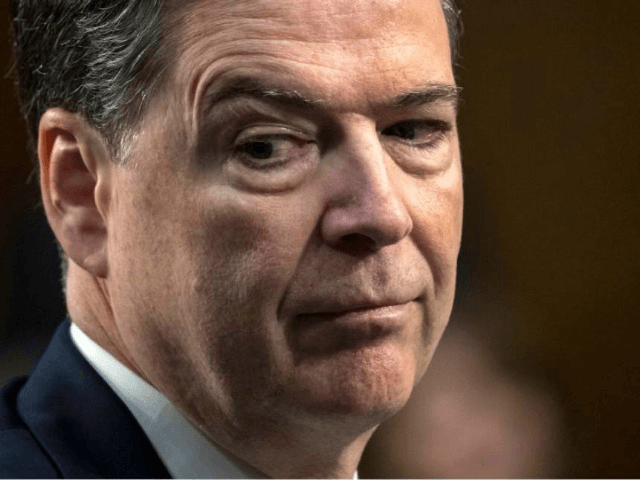Former FBI Director James Comey may have perjured himself when he told lawmakers last September that he made his decision not to recommend criminal charges against Hillary Clinton after he interviewed her.
Asked by Rep. John Ratcliffe (R-TX) during that hearing if he made the decision “before or after” she was interviewed by the FBI on July 2nd, Comey responded, “After.” Here’s the exchange:
RATCLIFFE: Thank you, Mr. Chairman. Director, did you make the decision not to recommend criminal charges relating to classified information before or after Hillary Clinton was interviewed by the FBI on July the 2nd?
COMEY: After.
However, interviews of two senior FBI officials recently obtained by Sens. Chuck Grassley (R-IA) and Lindsey Graham (R-SC) showed that Comey had drafted a statement exonerating Clinton before the FBI had interviewed her and 16 other witnesses.
One FBI official, Jim Rybicki, told the Office of Special Counsel that Comey, “knowing the direction” the investigation was headed, had decided either in late April or early May to give a statement exonerating Clinton, drafted a statement, and emailed it to a group of people.
According to the transcript, Rybicki said (emphasis added by Grassley and Graham):
Rybicki: The – so in the – sometime in the spring – again, I don’t remember exactly when, I – early spring I would say, the Director emailed a couple folks – I can’t remember exactly; I know I was on there, probably the Deputy Director, not the full, what I’ll call the briefing group, but a subset of that – to say, you know, again knowing sort of where – knowing the direction the investigation is headed, right, what would be the most forward-leaning thing we could do, right, information that we could put out about it…And — and, you know, by that — you know, so that — and he sent a draft around of, you know what – what it might look like. . . .
Q: And so at that point in time, whether it was April or early May, the team hadn’t yet interviewed Secretary Clinton –
Rybicki: Correct.
Q: – but was there – I guess, based on what you’re saying, it sounds like there was an idea of where the outcome of the investigation was going to go?
Rybicki: Sure. There was a – right, there was – based on – [redacted section].
The other FBI official, Trisha Anderson, told the OSC, “I believe it was in early May of 2016 that the director himself wrote a draft of that statement.”
Grassley and Graham have asked current FBI Director Christopher Wray to provide all drafts of Comey’s statement closing the Clinton investigation, and all records related to communications between or among FBI officials regarding that statement by September 13.
Comey’s actions have come into sharp focus this week, after the president’s former chief strategist Stephen Bannon said in a CBS 60 Minutes interview on Sunday that it was maybe the “biggest political mistake in modern history” for Trump to have fired Comey since it prompted the appointment of special counsel Robert Mueller.
White House Press Secretary Sarah Sanders on Monday defended the president’s decision to fire Comey, and alleged that Comey delivered “false testimony.”
“Since the director’s firing, we’ve learned new information about his conduct that only provided further justification for that firing, including giving false testimony, leaking privileged information to journalists, he went outside of the chain of command, and politicized an investigation into a presidential candidate,” she said.
Later, when asked whether Comey perjured himself, Sanders responded, “I think that’s something, probably, for DOJ to look at, not me. I’m not an attorney.” Her remarks sparked questions over whether Comey had perjured himself.
Comey also testified to senators on May 3 that he had never been an anonymous source for news reports. However, after he was fired, he admitted to giving memos to at least one friend to give to journalists.
And he has also shared the contents of his private conversations with friends long before he was fired, sometimes under the condition that they not share it until he was no longer in the position, as Breitbart News has detailed.
Graham on Thursday said he wants answers from Comey and threatened to subpoena him.
“He’s coming one way or the other,” Graham told Fox News’ “America’s Newsroom” on Thursday. “We now know that he had made up his mind to exonerate her before he even interviewed her, which is a bit odd.”
Graham noted that Comey had also testified that he had decided to deliver the statement after then-Attorney General Loretta Lynch met with Bill Clinton on a tarmac in June 2016, and he worried about the Justice Department’s impartiality in the case.
Comey has also said he spoke out because the Russians had an email between the Justice Department and the Democratic National Committee that talked about trying to rig the Clinton investigation, even though the document was believed to be fake. The FBI got a hold of that email in early March, according to the Washington Post.
“I can’t make sense of this,” Graham told Fox News. “I’m very suspicious of the timing. I’m very suspicious of the reason.”
“There is so much to be determined here. Comey needs to come back. What was his real reason for clearing Hillary Clinton? Had he made up his mind before he even talked to her?”

COMMENTS
Please let us know if you're having issues with commenting.